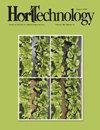2020 - 2021年新墨西哥州南部耐热莴苣品种的表现
IF 1.3
4区 农林科学
Q3 HORTICULTURE
引用次数: 0
摘要
莴苣(Lactuca sativa)是世界范围内种植的高价值作物。美国新墨西哥州的生菜收获面积落后于领先的生菜生产州(加利福尼亚州、亚利桑那州),但新墨西哥州的种植者有兴趣扩大产量。为了让新墨西哥州的农民增加生菜产量以进入新市场,需要有关耐热品种性能的信息。本研究旨在评估种子供应商或其他来源描述的六个耐热莴苣品种。在2020年和2021年,我们评估了两种白头翁,“Anueue”和“Mikola RG10”;两种绿叶类型,“Muir”和“Tropicana”;在新墨西哥州拉斯克鲁塞斯新墨西哥州立大学遗产农场的Jose Fernandez花园里,有两种罗马品种,“Parris Island Cos”和“Sparx”。为了确定哪些品种和类型的生菜更适合新墨西哥州南部,我们测量了这些变量:可销售的收获重量、从移植到第一次抽芽的天数以及从移植到50%抽芽的天数。2020年,“Sparx”是一种莴苣,与其他莴苣类型相比,产量平均高出32%。2021年,两个莴苣型品种Sparx和Parris Island Cos的市场产量都比其他莴苣品种高19%。2020年,“Sparx”是最后一个抽薹并达到50%抽薹阶段的品种,而2021年,“Mikola RG10”和“Muir”是最后两个抽薹并达到50%的品种。这些结果表明,对于新墨西哥州南部的农民来说,“Sparx”将是一个很好的潜在候选者Mikola RG10和Muir,分别是毛头莴苣和绿叶莴苣,在2021年表现出较慢的抽薹速度,这表明它们可能是延长新墨西哥州莴苣收成的有用品种。本文章由计算机程序翻译,如有差异,请以英文原文为准。
Performance of Heat-tolerant Lettuce Cultivars in Southern New Mexico in 2020—21
Lettuce (Lactuca sativa) is a high-value crop cultivated worldwide. Harvested lettuce acreage in New Mexico, USA, trails the leading lettuce production states (California, Arizona), but growers in New Mexico are interested in expanding their production. For New Mexico farmers to increase lettuce production to reach new markets, information on heat-tolerant cultivar performance is needed. This study was conducted to evaluate six lettuce cultivars described as heat tolerant by seed suppliers or other sources. In 2020 and 2021, we assessed two butterhead types, ‘Anuenue’ and ‘Mikola RG10’; two green leaf types, ‘Muir’ and ‘Tropicana’; and two romaine types, ‘Parris Island Cos’ and ‘Sparx’, in the Jose Fernandez Garden at the New Mexico State University Heritage Farm in Las Cruces, NM. To determine which cultivars and types of lettuce are better suited for southern New Mexico, we measured these variables: marketable harvest weight, number of days from transplant to first bolt, and number of days from transplant to 50% bolted. In 2020, ‘Sparx’, a romaine-type lettuce, had, on average, 32% higher yield compared with the other lettuce types. In 2021 both romaine-type cultivars, Sparx and Parris Island Cos, produced 19% more marketable yield than the other lettuce cultivars. In 2020, ‘Sparx’ was the last to bolt and to reach the 50% bolted stage, whereas in 2021 ‘Mikola RG10’ and ‘Muir’ were the last cultivars to bolt and reach the 50% bolted stage. These results suggest that ‘Sparx’ would be a good potential candidate for farmers in southern New Mexico. ‘Mikola RG10’ and ‘Muir’, butterhead and green leaf type, respectively, demonstrated slower bolting in 2021, indicating they may be useful cultivars for extending lettuce harvest in New Mexico.
求助全文
通过发布文献求助,成功后即可免费获取论文全文。
去求助
来源期刊

Horttechnology
农林科学-园艺
CiteScore
2.30
自引率
10.00%
发文量
67
审稿时长
3 months
期刊介绍:
HortTechnology serves as the primary outreach publication of the American Society for Horticultural Science. Its mission is to provide science-based information to professional horticulturists, practitioners, and educators; promote and encourage an interchange of ideas among scientists, educators, and professionals working in horticulture; and provide an opportunity for peer review of practical horticultural information.
 求助内容:
求助内容: 应助结果提醒方式:
应助结果提醒方式:


